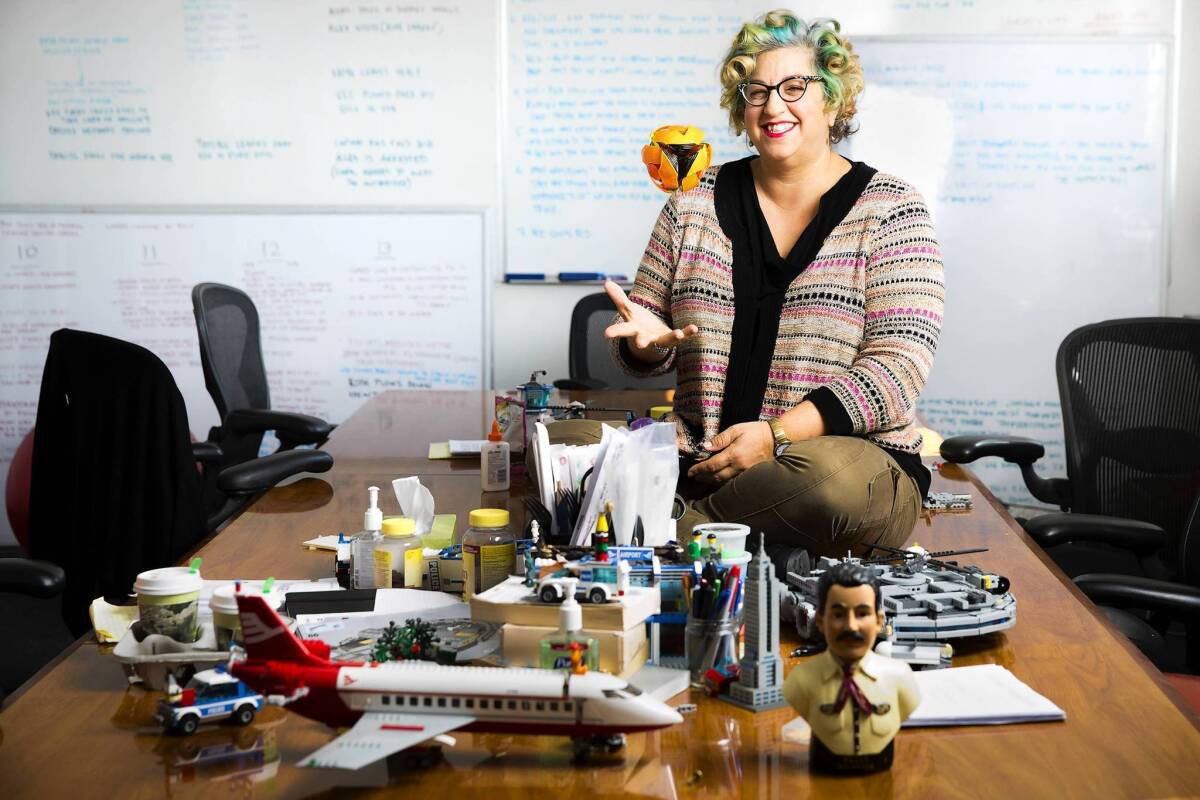‘Orange Is the New Black’ creator Jenji Kohan aims for ‘a real ride’

- Share via
When show creator Jenji Kohan threw in with Netflix at the outset of its original programming efforts, that was still a gutsy move. “I traded money for freedom, in essence,” says the veteran TV writer of her move to what she calls “the new frontier.” “I had a good experience making ‘Weeds’ at Showtime, and that made it vital not to take a step backwards, into a culture of fear, and being micro-managed. And Netflix has been wide-open, embracing and smart. I love being out in front. It’s exciting. And why not?”
FOR THE RECORD:
“Orange Is the New Black”: An article in the Nov. 21 issue of The Envelope about Jenji Kohan, creator of the Netflix series “Orange Is the New Black,” misspelled the last name of memoirist Piper Kerman, whose book the series is based on, as Kernan. —
Her series, “Orange Is the New Black,” which she adapted from Piper Kernan’s fish-out-of-water memoir about her stretch in federal prison for drug trafficking, has been renewed for a second season. Critical reception has ranged from appreciative to rapturous. From its in-your-face title sequence and largely female, multiracial cast to its frank, often funny depiction of gay or flexible sexuality, it feels like groundbreaking television, and the depth and surprise of the writing is a constant revelation.
PHOTOS: Before they were on ‘Orange Is the New Black’
We’ve seen other shows, like “The Wire,” that dwell on people of color and penetrate different social strata. Why does this one feel so different?
I don’t know. Maybe because it’s a bunch of women? And also, there’s humor. That makes a big difference. I don’t believe in straight drama. If you’re not including what’s funny, you’re not being true to the human condition. And I think everything’s funny. Inappropriately so.
By the end of the season, your main character, Piper, has been stripped bare psychologically and plunged into crisis to the point that she’s literally fighting for her life. Her boyfriend’s parents have warned him that prison will change her. Is that what you’re going for?
It’s more that we wanted to take this character on a full journey. She starts out in prison thinking of herself as a nice person, and over time we watch her adjust and go primal. So even if we didn’t get picked up, you’d feel like you’d taken a real ride. She’s a flawed human being; we all are. We’re always trying to be better but failing. She’s a woman on a continual search for identity. A lot of the show is about figuring out who you are and what mask you’re going to wear in what environment. Ultimately we found it most interesting to see her kind of go native.
PHOTOS: Behind the scenes of movies and TV
This kind of television writing can be tough, when you have no format or procedure to rely on. How do you navigate through the hour?
I’ve kind of been walking that tightrope without a net for a while. “Weeds” [a half-hour series] was this weird hybrid comedy-drama thing we came up with, so this is the same, but doubled. I just think if you have really engaging characters, there’s always more story. You lead with different people, and whatever story you’re interested in telling that week you play through. We don’t have to hit marks or have act breaks. That gives us more breathing room and noodling room. If we have a flight of fancy, we can take it.
Did you seek out writers who had experience with the prison system?
No, because you can do research. I needed talent, and that’s what I got. I read pilots, short stories, plays. I look for an original voice — writing that resonates with me days after I read it. And I don’t care if they’ve never been on a show before — in fact, I love newbies, because they don’t know the rules, and I think that’s exciting.
“Weeds” preceded the relaxing of drug laws, and this show is airing at a time when problems with the prison-industrial complex are coming to the fore. Is it your goal to have your finger on the pulse?
I’ve always used my shows to express a certain agenda, and I don’t hide that, but if I become didactic as opposed to entertaining, then I’m not doing my job. Mainly, I’m doing my thing, and I hope people like it. I don’t say, ‘I’m going to write something radical and hope it reverberates throughout society.’ The goal is to write a solid, entertaining, engaging show.
But that said, aren’t drug offenses the main reason that women go to prison?
That and crimes committed for the men in their lives, or against the men in their lives. The system is deeply flawed and broken, and it’s depressing that a supposed world power can’t deal with its prison population, or maybe is intentionally growing it. I can’t fix it but I can talk about it, and hopefully people who can fix it might. My goal is more to start discussions. I’m going to do what I do, and if someone wants to take it and run with it, then I’m thrilled.
More to Read
From the Oscars to the Emmys.
Get the Envelope newsletter for exclusive awards season coverage, behind-the-scenes stories from the Envelope podcast and columnist Glenn Whipp’s must-read analysis.
You may occasionally receive promotional content from the Los Angeles Times.










